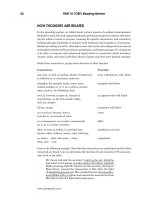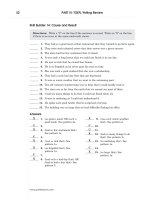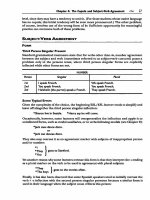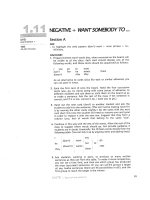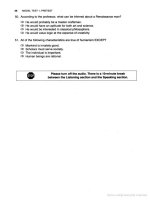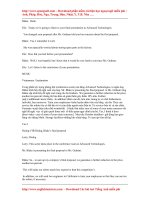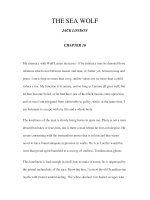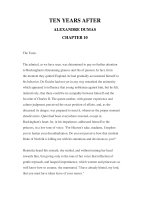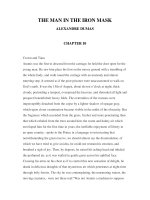History or historycal corres 10 pps
Bạn đang xem bản rút gọn của tài liệu. Xem và tải ngay bản đầy đủ của tài liệu tại đây (74.75 KB, 6 trang )
piece See PEACE OR PIECE?.
pieriod Wrong spelling. See
PERIOD.
pigmy/pygmy (singular) pigmies/pygmies (plural)
pining or pinning? pine +ing = pining
pin + ing = pinning
See
ADDING ENDINGS (i), (ii).
plateau (singular) plateaus or plateaux (plural)
See
FOREIGN PLURALS.
plausible
pleasant (not plesant)
pleasure
plural See
SINGULAR OR PLURAL?.
plurals (i) Most words form their plural by
adding -s:
door doors; word words; bag bags;
rainbow rainbows; shop shops; car
cars
(ii) Words ending in a sibilant (a hissing
sound) add -es to form their plural.
This adds a syllable to their
pronunciation and so you can always
hear when this has happened:
bus buses; box boxes; fez fezes/fezzes;
bench benches; bush bushes; hutch
hutches.
(iii) Words ending in -y are a special case.
Look at the letter that precedes the
final -y. If the word ends in vowel
+y, just add -s to form the plural
(vowels: a, e, i, o, u):
day days
donkey donkeys
boy boys
guy guys
PLURALS
137
If the word ends in consonant + y,
change the y to i, and add -es:
lobby lobbies
opportunity opportunities
body bodies
century centuries
This rule is well worth learning by
heart. There are no exceptions.
Remember an easy example as a key
like boy/boys.
(iv) Words ending in -o generally add -s to
form the plural:
piano pianos
banjo banjos
studio studios
soprano sopranos
photo photos
kimono kimonos
There are nine exceptions which add -
es:
domino dominoes
echo echoes
embargo embargoes
hero heroes
mosquito mosquitoes
no noes
potato potatoes
tomato tomatoes
torpedo torpedoes
About a dozen words can be either -s
or -es and so you’ll be safe with
these. Interestingly, some of these
words until recently have required -es
(words like cargo, mango, memento,
volcano). The trend is towards the
regular -s ending and some words are
in a transitional stage.
138
PLURALS
(v) Words ending in -f and -fe generally
add -s to form the plural:
roof roofs
cliff cliffs
handkerchief handkerchiefs
carafe carafes
giraffe giraffes
There are 13 exceptions which end in
-ves in the plural. You can always
hear when this is the case, but here is
the complete list for reference:
knife/knives; life/lives; wife/wives;
elf/elves; self/selves; shelf/shelves;
calf/calves; half/halves; leaf/leaves;
sheaf/sheaves; thief/thieves; loaf/loaves;
wolf/wolves.
Four words can be either -fs or -ves:
hoofs/hooves; scarfs/scarves;
turfs/turves; wharfs/wharves.
(vi) Some nouns are quite irregular in the
formation of their plural.
Some words don’t change:
aircraft, cannon, bison, cod, deer,
sheep, trout
Some have a choice about changing or
staying the same in the plural:
buffalo or buffaloes
Eskimo or Eskimos
Other everyday words have very
peculiar plurals which perhaps we
take for granted:
man men ox oxen
woman women mouse mice
child children louse lice
foot feet die dice
goose geese
PLURALS
139
After goose/geese, mongoose/
mongooses seems very strange but is
correct.
See also
FOREIGN PLURALS.
pneumonia
possability Wrong spelling. See
POSSIBILITY.
possable Wrong spelling. See
POSSIBLE.
possess possessed, possessing
possession
possessive apostrophes See APOSTROPHES
(ii), (iii).
possessive pronouns No apostrophes are needed with
possessive pronouns:
That is MINE.ThatisOURS.
That is THINE.ThatisYOURS.
That is HERS.ThatisTHEIRS.
That is HIS.
That is ITS.
possessor
possibility
possible (not -able)
possible or probable? POSSIBLE = could happen
PROBABLE =verylikelytohappen
potato (singular) potatoes (plural)
See
PLURALS (iv).
practical or A PRACTICAL person is one who is good
practicable? at doing and making things.
A PRACTICAL suggestion is a sensible,
realistic one that is likely to succeed.
A PRACTICABLE suggestion is merely
one that will work. The word ‘practicable’
means ‘able to be put into practice’. It
does not carry all the additional meanings
of ‘practical’.
140
PNEUMONIA
practice or practise? Use these exemplar sentences as a guide:
PRACTICE makes perfect.
An hour’s PRACTICE every day will yield
returns.
The young doctor has built up a busy
PRACTICE.
In the examples above, ‘practice’ is a
noun.
You should PRACTISE every day.
PRACTISE now!
In these examples, ‘practise’ is a verb.
precede or proceed? PRECEDE =togoinfrontof
PROCEED = to carry on, especially after
having stopped
prefer preferred, preferring, preference
See
ADDING ENDINGS (iv).
prehaps Wrong spelling. See
PERHAPS.
prejudice
preparation
prepositions Prepositions are small words like ‘by’,
‘with’, ‘for’, ‘to’, which are placed before
nouns and pronouns to show how they
connect with other words in the sentence:
They gave the flowers TO their mother.
Let him sit NEAR you.
Two problems can arise with prepositions.
(i) Take care to choose the correct
preposition. A good dictionary will
help you:
comply with
protest at
deficient in
ignorant of
similar to, and so on.
PREPOSITIONS
141
(ii) Don’t take too seriously the oft-
repeated advice not to end a sentence
with a preposition. Use your
discretion, and word your sentence
however it sounds best to you.
Do you prefer the first or the
second sentence here?
(a) WITH whom are you?
(b) Who are you WITH?
Which do you prefer here?
(c) She’s a politician FOR whom I
have a great deal of respect.
(d) She’s a politician I have a great
deal of respect FOR.
present (not -ant)
presume See
ASSUME OR PRESUME?.
priest See
EI/IE SPELLING RULE.
primitive (not -mat-)
principal or principle? Use these exemplar sentences as a guide:
Rebuilding the school is their PRINCIPAL
aim. (= chief)
The PRINCIPAL announced the results.
(= chief teacher)
His guiding PRINCIPLE was to judge no
one hastily. (= moral rule)
privilege (not privelege or priviledge)
probable Se e
POSSIBLE OR PROBABLE?.
probably (not propably)
procedure (not proceedure)
proceed See
PRECEDE OR PROCEED?.
proclaim
proclamation (not -claim-)
142
PRESENT
